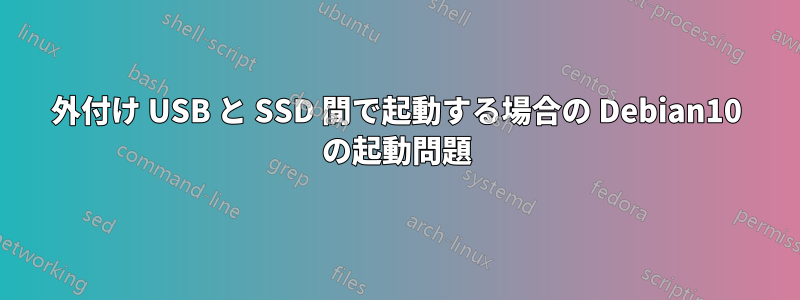
内部 HDD に Debian 10 をインストールしましたが、UEFI セキュア ブートで正常に動作しました。
2 番目の Debian を外付け USB にインストールすると、その USB からのみ起動します。
SSDを起動するためにノートパソコンからUSBを抜くとエラーが発生します
最小限の bash のような行編集。
セキュアブートを無効にしても効果はありませんでした。
Disk /dev/sda: 238,5 GiB, 256060514304 bytes, 500118192 sectors
Disk model
Units: sectors of 1 * 512 = 512 bytes
Sector size (logical/physical): 512 bytes / 512 bytes
I/O size (minimum/optimal): 512 bytes / 512 bytes
Disklabel type: gpt
Disk identifier:
Device Start End Sectors Size Type
/dev/sda1 2048 1050623 1048576 512M EFI System
/dev/sda2 1050624 1550335 499712 244M Linux filesystem
/dev/sda3 1550336 500117503 498567168 237,8G Linux filesystem
Disk /dev/sdb: 57,3 GiB, 61505273856 bytes, 120127488 sectors
Disk model: Ultra USB 3.0
Units: sectors of 1 * 512 = 512 bytes
Sector size (logical/physical): 512 bytes / 512 bytes
I/O size (minimum/optimal): 512 bytes / 512 bytes
Disklabel type: gpt
Disk identifier:
Device Start End Sectors Size Type
/dev/sdb1 2048 1050623 1048576 512M EFI System
/dev/sdb2 1050624 1550335 499712 244M Linux filesystem
/dev/sdb3 1550336 120125439 118575104 56,6G Linux filesystem
Disk /dev/mapper/sdc3_crypt: 56,5 GiB, 60693676032 bytes, 118542336 sectors
Units: sectors of 1 * 512 = 512 bytes
Sector size (logical/physical): 512 bytes / 512 bytes
I/O size (minimum/optimal): 512 bytes / 512 bytes
Disk /dev/mapper/usb--vg-root: 48,7 GiB, 52240056320 bytes, 102031360 sectors
Units: sectors of 1 * 512 = 512 bytes
Sector size (logical/physical): 512 bytes / 512 bytes
I/O size (minimum/optimal): 512 bytes / 512 bytes
Disk /dev/mapper/usb--vg-swap_1: 7,9 GiB, 8451522560 bytes, 16506880 sectors
Units: sectors of 1 * 512 = 512 bytes
Sector size (logical/physical): 512 bytes / 512 bytes
I/O size (minimum/optimal): 512 bytes / 512 bytes
lvs出力
LV VG Attr LSize Pool Origin Data% Meta% Move Log Cpy%Sync Convert
root intern-vg -wi-a----- 229,80g
swap_1 intern-vg -wi-a----- <7,87g
root usb-vg -wi-ao---- 48,65g
swap_1 usb-vg -wi-ao---- 7,87g
答え1
この記事の執筆時点では、Debian 10 はまだtesting開発段階であるため、あちこちに粗い部分がある可能性があることに注意してください。
私の推測では、Debian インストーラーは 2 番目のインストールがリムーバブル ドライブ上に行われることを知らず、EFI システム パーティション (ESP) 上の GRUB の最初のインストールのコピーを、USB デバイスから起動するように構成されたコピーで上書きしたと考えられます。
修正するには、次の 2 つの操作を任意の順序で実行する必要があります。
1.) USB ベースのインストールが単独で起動可能であることを確認する必要があります。つまり、USB ドライブには、ブートローダーのコピーを含む FAT32 パーティションが含まれている必要があります\EFI\boot\bootx64.efi。これが、リムーバブル USB を UEFI の意味で起動可能にするものです。
2.) 内部 HDD 上のインストールのブートローダーを修正するには、USB ベースのインストールを起動し、内部 HDD ベースのインストールのパーティションをマウントして、そのインストールに chroot します。
出力fdisk -lから、おそらく LVM も使用されていることがわかります。
出力に基づくとfdisk -l、これは必要なコマンドの始まりであるはずです。これらはすべて root として実行する必要があることに注意してください。そのため、最初に を使用してsu -root パスワードを入力するか、またはを使用sudo -iして自分のパスワードを入力して root になります。
# mkdir /mnt/hddsystem
# cryptsetup luksOpen /dev/sda3 sda3_crypt
<the above command will ask you the encryption passphrase of the HDD installation.
If successful, then /dev/mapper/sda3_crypt should now exist>
# vgscan
<this detects the LVM volume group within the encrypted container of the HDD installation>
# lvs
<this displays all the detected LVM logical volumes and their names>
# vgchange -ay intern-vg
# mount /dev/mapper/intern--vg-root /mnt/hddsystem
<if successful, directories like /mnt/hddsystem/dev, /mnt/hddsystem/proc, /mnt/hddsystem/sys
should be visible and empty at this point. Other directories should be visible under /mnt/hddsystem too.>
# mount /dev/sda2 /mnt/hddsystem/boot
# mount /dev/sda1 /mnt/hddsystem/boot/efi
この時点で、HDD に上書きする前に、実際に起動する USB メディアを探す GRUB のバージョンを USB にコピーするだけで、USB システムの起動も簡単に修正できる可能性があります。
# mkdir /mnt/usb-esp
# mount /dev/sdb1 /mnt/usb-esp
# mkdir -p /mnt/usb-esp/EFI/boot
# cp -r /mnt/hddsystem/boot/efi/EFI/debian /mnt/usb-esp/EFI/
# cp /mnt/usb-esp/EFI/debian/grubx64.efi /mnt/usb-esp/EFI/boot/
# cp /mnt/hddsystem/boot/efi/EFI/debian/shimx64.efi /mnt/usb-esp/EFI/boot/bootx64.efi
# umount /mnt/usb-esp
HDD のインストールの修正に戻ります...
# mount -o bind /dev /mnt/hddsystem/dev
# mount -o bind /proc /mnt/hddsystem/proc
# mount -o bind /sys /mnt/hddsystem/sys
<these commands are preparations for the following chroot command, mounting all the necessary real and virtual filesystems so that the inactive HDD-based installation can be used like an active, running system.>
# chroot /mnt/hddsystem /bin/bash
<this command transitions us to the HDD-based environment; from this point onwards, for this shell session only, /mnt/hddsystem is /.>
# grub-install /dev/sda1
# update-grub
<these two commands to fix the bootloader are what all the preparations above were for.>


